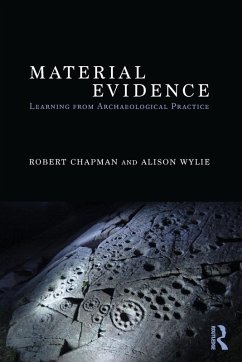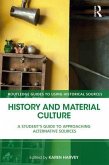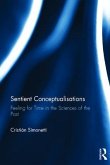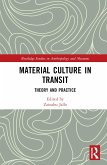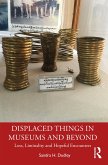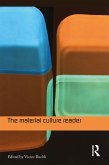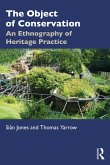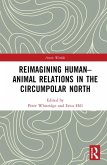Material Evidence
Learning from Archaeological Practice
Herausgeber: Chapman, Robert; Wylie, Alison
Material Evidence
Learning from Archaeological Practice
Herausgeber: Chapman, Robert; Wylie, Alison
- Broschiertes Buch
- Merkliste
- Auf die Merkliste
- Bewerten Bewerten
- Teilen
- Produkt teilen
- Produkterinnerung
- Produkterinnerung
Material Evidence takes a resolutely case-based approach, exploring key instances of exemplary practice, critical turning points, and innovative developments in the use of archaeological data as evidence. In doing so, it identifies norms of evidential reasoning that underpin judgments of epistemic credibility in archaeology.
Andere Kunden interessierten sich auch für
![History and Material Culture History and Material Culture]() History and Material Culture53,99 €
History and Material Culture53,99 €![Sentient Conceptualisations Sentient Conceptualisations]() Cristian Simonetti (UK University of Aberdeen)Sentient Conceptualisations179,99 €
Cristian Simonetti (UK University of Aberdeen)Sentient Conceptualisations179,99 €![Material Culture in Transit Material Culture in Transit]() Material Culture in Transit152,99 €
Material Culture in Transit152,99 €![Displaced Things in Museums and Beyond Displaced Things in Museums and Beyond]() Sandra H. Dudley (UK University of Leicester)Displaced Things in Museums and Beyond55,99 €
Sandra H. Dudley (UK University of Leicester)Displaced Things in Museums and Beyond55,99 €![The Material Culture Reader The Material Culture Reader]() The Material Culture Reader43,99 €
The Material Culture Reader43,99 €![The Object of Conservation The Object of Conservation]() Siân JonesThe Object of Conservation35,99 €
Siân JonesThe Object of Conservation35,99 €![Reimagining Human-Animal Relations in the Circumpolar North Reimagining Human-Animal Relations in the Circumpolar North]() Reimagining Human-Animal Relations in the Circumpolar North179,99 €
Reimagining Human-Animal Relations in the Circumpolar North179,99 €-
-
-
Material Evidence takes a resolutely case-based approach, exploring key instances of exemplary practice, critical turning points, and innovative developments in the use of archaeological data as evidence. In doing so, it identifies norms of evidential reasoning that underpin judgments of epistemic credibility in archaeology.
Produktdetails
- Produktdetails
- Verlag: Taylor & Francis Ltd
- Seitenzahl: 380
- Erscheinungstermin: 12. Dezember 2014
- Englisch
- Abmessung: 226mm x 155mm x 23mm
- Gewicht: 658g
- ISBN-13: 9780415837460
- ISBN-10: 0415837464
- Artikelnr.: 41217399
- Verlag: Taylor & Francis Ltd
- Seitenzahl: 380
- Erscheinungstermin: 12. Dezember 2014
- Englisch
- Abmessung: 226mm x 155mm x 23mm
- Gewicht: 658g
- ISBN-13: 9780415837460
- ISBN-10: 0415837464
- Artikelnr.: 41217399
Bob Chapman is Emeritus Professor of Archaeology at the University of Reading, UK. His research focuses on archaeological theory, Mediterranean later prehistory, the development of human inequality and the means by which this can be studied with archaeological data. He has pursued these interests in fieldwork projects in southeast Spain and the Balearic Islands, as well as in books such as The Archaeology of Death (1981), Emerging Complexity (1990) and Archaeologies of Complexity (2003). In recent years his research has turned increasingly to the use of historical materialism in archaeological interpretation, especially in relation to inequality and human exploitation. Running through this research activity has been a strong concern for the nature of archaeological interpretation, working with the complementary evidence of how people lived (e.g. what they produced, exchanged and consumed, centred on settlement evidence) and how they were treated in death (e.g. their disposal, centred on burial evidence). Alison Wylie is Professor of Philosophy and Anthropology at the University of Washington, and of Philosophy at Durham University. She is a philosopher of the social and historical sciences who works on questions about objectivity, evidence, and research ethics raised by archaeological practice and by feminist research in the social sciences. Her longstanding interest in evidential reasoning is represented by Thinking from Things (2002) and by contributions to Evidence, Inference and Enquiry (Dawid, Twining and Vasilaki, 2011), How Well do 'Facts' Travel? (Morgan, 2010), and Agnatology (Proctor and Schiebinger, 2008). In recent work she focuses on the role of contextual values in science and on how research can be improved by internal diversity and by collaborations that extend beyond the research community. These interests are reflected in Value-free Science? (co-edited with Kincaid and Dupré, 2007) and Epistemic Diversity and Dissent (edited for Episteme 2006), as well as in essays on stewardship and feminist standpoint theory.
Section 1. Conventions of field practice 1. Repeating the unrepeatable
experiment 2. Experimental Archaeology at the crossroads: A contribution to
interpretation or evidence of 'xeroxing'? 3. Working Archives: Mucking,
Great Wilbraham and the chimera of 'Total Archaeology' 4. Excavation as
debate Section 2. Recording conventions: Typological and stratigraphic
units 5. 'Proportional representation': Multiple voices in archaeological
interpretation at Çatalhöyük 6. The tyranny of typologies: Nationality and
evidential reasoning in Romano-Egyptian archaeology7. High-resolution
ecological and social histories at Çatalhöyük: Eliciting evidence from
microstratigraphy 8. Integrating database design and use into recording
methodologies Section 3. Cross-field trade: Archaeological applications of
external expertise and technologies 9. The Archaeological Bazaar: Anybody
want to buy some science? 10. 'The economics of archaeological science:
Innovation, ring fences, calibration' 11. The world around: Studying the
emergence of structure in past landscapes 12. Crafting knowledge with
(digital) visual media in archaeology Section 4. Multiple working
hypotheses, strategies of elimination, and triangulation 13. Lessons from
modeling Neolithic farming practice: methods of elimination 14. Uncertain
on principle: Combining lines of archaeological evidence to create
chronologies 15. A 'mixed mass of facts' 16. Archaeology and law: An
initial exploration Section 5. Broader perspectives: Material culture as
object and evidence 17. Meeting pasts halfway: A consideration of the
ontology of archaeological material evidence 18. Matter and facts: Material
culture in the history of science
experiment 2. Experimental Archaeology at the crossroads: A contribution to
interpretation or evidence of 'xeroxing'? 3. Working Archives: Mucking,
Great Wilbraham and the chimera of 'Total Archaeology' 4. Excavation as
debate Section 2. Recording conventions: Typological and stratigraphic
units 5. 'Proportional representation': Multiple voices in archaeological
interpretation at Çatalhöyük 6. The tyranny of typologies: Nationality and
evidential reasoning in Romano-Egyptian archaeology7. High-resolution
ecological and social histories at Çatalhöyük: Eliciting evidence from
microstratigraphy 8. Integrating database design and use into recording
methodologies Section 3. Cross-field trade: Archaeological applications of
external expertise and technologies 9. The Archaeological Bazaar: Anybody
want to buy some science? 10. 'The economics of archaeological science:
Innovation, ring fences, calibration' 11. The world around: Studying the
emergence of structure in past landscapes 12. Crafting knowledge with
(digital) visual media in archaeology Section 4. Multiple working
hypotheses, strategies of elimination, and triangulation 13. Lessons from
modeling Neolithic farming practice: methods of elimination 14. Uncertain
on principle: Combining lines of archaeological evidence to create
chronologies 15. A 'mixed mass of facts' 16. Archaeology and law: An
initial exploration Section 5. Broader perspectives: Material culture as
object and evidence 17. Meeting pasts halfway: A consideration of the
ontology of archaeological material evidence 18. Matter and facts: Material
culture in the history of science
Section 1. Conventions of field practice 1. Repeating the unrepeatable
experiment 2. Experimental Archaeology at the crossroads: A contribution to
interpretation or evidence of 'xeroxing'? 3. Working Archives: Mucking,
Great Wilbraham and the chimera of 'Total Archaeology' 4. Excavation as
debate Section 2. Recording conventions: Typological and stratigraphic
units 5. 'Proportional representation': Multiple voices in archaeological
interpretation at Çatalhöyük 6. The tyranny of typologies: Nationality and
evidential reasoning in Romano-Egyptian archaeology7. High-resolution
ecological and social histories at Çatalhöyük: Eliciting evidence from
microstratigraphy 8. Integrating database design and use into recording
methodologies Section 3. Cross-field trade: Archaeological applications of
external expertise and technologies 9. The Archaeological Bazaar: Anybody
want to buy some science? 10. 'The economics of archaeological science:
Innovation, ring fences, calibration' 11. The world around: Studying the
emergence of structure in past landscapes 12. Crafting knowledge with
(digital) visual media in archaeology Section 4. Multiple working
hypotheses, strategies of elimination, and triangulation 13. Lessons from
modeling Neolithic farming practice: methods of elimination 14. Uncertain
on principle: Combining lines of archaeological evidence to create
chronologies 15. A 'mixed mass of facts' 16. Archaeology and law: An
initial exploration Section 5. Broader perspectives: Material culture as
object and evidence 17. Meeting pasts halfway: A consideration of the
ontology of archaeological material evidence 18. Matter and facts: Material
culture in the history of science
experiment 2. Experimental Archaeology at the crossroads: A contribution to
interpretation or evidence of 'xeroxing'? 3. Working Archives: Mucking,
Great Wilbraham and the chimera of 'Total Archaeology' 4. Excavation as
debate Section 2. Recording conventions: Typological and stratigraphic
units 5. 'Proportional representation': Multiple voices in archaeological
interpretation at Çatalhöyük 6. The tyranny of typologies: Nationality and
evidential reasoning in Romano-Egyptian archaeology7. High-resolution
ecological and social histories at Çatalhöyük: Eliciting evidence from
microstratigraphy 8. Integrating database design and use into recording
methodologies Section 3. Cross-field trade: Archaeological applications of
external expertise and technologies 9. The Archaeological Bazaar: Anybody
want to buy some science? 10. 'The economics of archaeological science:
Innovation, ring fences, calibration' 11. The world around: Studying the
emergence of structure in past landscapes 12. Crafting knowledge with
(digital) visual media in archaeology Section 4. Multiple working
hypotheses, strategies of elimination, and triangulation 13. Lessons from
modeling Neolithic farming practice: methods of elimination 14. Uncertain
on principle: Combining lines of archaeological evidence to create
chronologies 15. A 'mixed mass of facts' 16. Archaeology and law: An
initial exploration Section 5. Broader perspectives: Material culture as
object and evidence 17. Meeting pasts halfway: A consideration of the
ontology of archaeological material evidence 18. Matter and facts: Material
culture in the history of science

